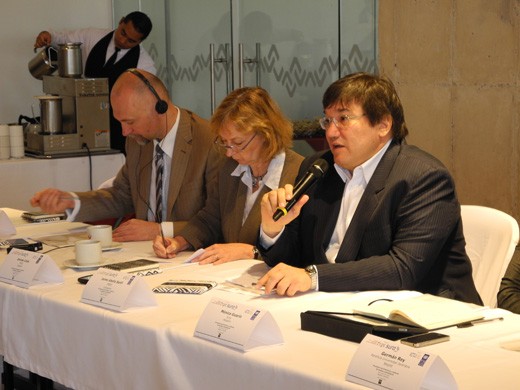Media play an essential role in peace negotiations and post-conflict situations. In the highly polarized and politicized context of Colombia, the Gabriel García Márquez Foundation for New Ibero-American Journalism (FNPI) chose May 3, Worldwide Freedom of Expression Day, to bring together directors and editors of Colombia’s main news media to reflect on their role at a historic moment for the country: the government’s peace talks with the FARC, which represent a possible end to five decades of armed conflict.
The meeting was attended not only by directors and publishers of publications like El Espectador, Semana, and El Tiempo, but also political figures—such as the minister of Interior, Fernando Carrillo Flórez, Senator Roy Barreras and Congressman Iván Cepeda.
Communication studies researchers—such as Claudia Mejía, coordinator of the Antonio Nariño Project; and Jorge Iván Bonilla, of EAFIT University—presented the results of their surveys on freedom of expression in Colombia and the coverage of the armed conflict.
Refik Hodzic, ICTJ’s communications director, discussed the role of media in transitional contexts and lessons learned in countries such as South Africa, Peru, and Bosnia.
Colombian politicians have called on the media to play a “proactive” role in constructing peace. In the words of Barreras: “The task of the media is to build spaces for public opinion; they are not neutral in terms of constructing peace, nor should they be. They should help build consensus.”
Cepeda insisted on the importance of switching from a language of war to a language of postwar. “To truly change the cultural paradigm we need to start thinking in new terms,” he argued. “We need to explain that nothing is more beneficial for the country, in both economic and social terms, than peace.”
Debate centered on both coverage of the peace talks and the role the media could play once the armed conflict ends. The Minister for the Interior, Fernando Carrillo Flórez, remarked that “the most complicated scenario is going to be the postwar period.” In his view, “The media are going to play an educational role.”
Marisol Gómez, one of the editors of El Tiempo, also underlined how important it is for the media to educate the public about the peace process, “Starting by explaining the dichotomy between impunity and transitional justice.”
Hodzic began his presentation by clarifying the concept of transitional justice in Colombia. Though it is very much present in the public sphere, the concept has been heavily politicized, leading to some misunderstandings: “Transitional justice is not impunity; it’s not an alternative to accountability in the criminal justice system,” he said, referring to transitional justice as a set of measures that reflect society’s effort to break with the past of abuse and crimes.
“Transitional justice is about bringing perpetrators to justice and making sure that victims are compensated, that the truth is established, and that institutions are reformed so that those who have committed crimes don’t continue in positions of power.”
Such measures can be catalysts forlong-term social change, Hodzic insisted, and media today are a key agent in any such process. "Journalists should acknowledge the crucial role that media can play in creating collective narratives that can build or destroy a peace process.”
Hodzic highlighted the positive role the media played in broadcasting the work of the Truth and Reconciliation Commission in South Africa and relaying the human story unfolding before it.
The opposite happened in Peru and the Balkans, where media amplified political polarization around the transitional justice mechanisms, such as the TRC and the tribunals (including the International Court for the Former Yugoslavia). In both countries, media often focusing on marginal issues and political spin instead of the stories of victims and the facts established about crimes.
In his conclusion, Hodzic called on the Colombian media not to leave topics as important as the peace process or transitional justice entirely up to politicians. “These are issues of societal importance that should be above day-to-day politics and ideological polarization, as they affect all citizens and the decisions made about transitional justice will shape the long-term future of the country,” he argued.
The final panel gathered representatives of regional media, who shared their experiences and challenges in covering the peace process and the territories where the conflict is still ongoing.
Jaime Abello, FNPI’s executive director, highlighted the vital role that regional media play in the coverage of the peace process, in avoiding a “Bogotanization” of negotiations, or feeling of alienation towards a process that might be seen as “imposed” from outside. To this end, FNPI, in partnership with the High Commissioner for Peace and in collaboration with ICTJ, is organizing regional workshops for journalists on issues such as the coverage of the peace process and transitional justice.
Photo: Jaime Abello, Executive Director of FNPI (right), Denise Cook, Adviser on Peace and Development PNUD in Colombia (center), and Refik Hodzic, Communications Director of ICTJ (left) during a meeting of editors and journalists in Bogotá, Colombia, May 3, 2013. Marta Martínez/ICTJ.
